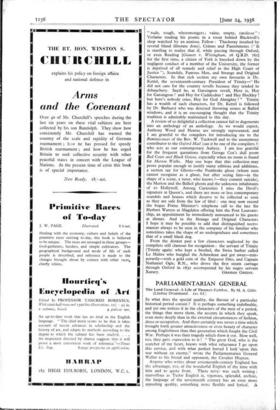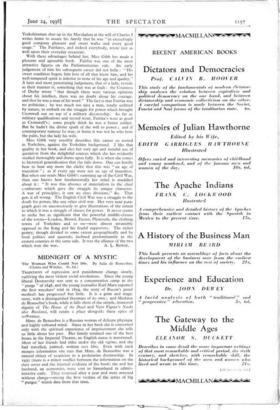PARLIAMENTARIAN GENERAL
The Lord General: A Life of Thomas Fairfax. By M. A. Gibb. (Lindsay Drummond. 12s. 63.) The Lord General: A Life of Thomas Fairfax. By M. A. Gibb. (Lindsay Drummond. 12s. 63.) IN what does the special quality, the flavour of a particular historical period consist ? It is perhaps something indefinable, and yet one notices it in the characters of the men of a period, the things that move them, the accents in which they speak, even more deeply than in the external circumstances of fashion, dress or occupation. And there certainly was never a time which brought forth greater attractiveness or even beauty of character among Englishmen than that generation which fought the Civil War. Perhaps it was their tragedy which drew it out. How well, too, they gave expression to it ! " The great God, who is the searcher of my heart, knows with what reluctance I go upon this service, and with what perfect hatred I look 'upon this war without an enemy," wrote the Parliamentarian General Waller to his friend and opponent, the Cavalier Hopton.
Anyone who writes about seventeenth-century England has the advantage, too, of the wonderful English of the time with him and to quote from. There neve: was such writing : marvellous as Tudor English is, vigorous, splendid, archaic, the language of the seventeenth century has an even more appealing quality, something more flexible and lyrical. A
Yorkshireman shut up in the Marshalsea at the will of Charles I writes home to assure his family that he was " in exceedingly good company pleasant and sweet walks and every good usage." The Fairfaxes, and indeed everybody, wrote just as well upon their everyday occasions.
With these advantages behind her, Miss Gibb has made a pleasant and agreeable book. Fairfax was one of the most attractive figures on the Parliamentarian side. An early judgement of him his subsequent career did not belie : " His sweet condition begets him love of all that know him, and his well-tempered spirit is inferior to none of his age and quality." A later and more penetrating judgement, that of a lady, reveals as their manner is, something that was at fault : the Countess of Derby wrote " that though there were various opinions about his intellect, there was no doubt about his courage, and that he was a man of his word." The fact is that Fairfax was no politician; he was much too nice a man, totally unfitted by nature, to embark on the struggle for power which brought Cromwell out on top of a military dictatorship. So far as military qualifications and record went, Fairfax's were as good as Cromwell's ; some people think he was a better soldier. But he hadn't the divine spark of the will to power ; and if contemporary rumour be true, at home it was not he who bore the palm, but the lady his wife.
Miss Gibb very sensibly describes this career so rooted in Yorkshire, against the Yorkshire background. I like that quality in her book, and also her very apt and tasteful use of quotation from the delightful sources which she has evidently studied thoroughly and draws upon fully. It is when she comes to historical generalisation that she falls down. One can hardly bear to hear any more the cliché that this was " an age of transition " ; as if every age were not an age of transition. But when one reads Miss Gibb's summing up of the Civil War, then one knows how fundamentally her mind is muddled about it : " It was this absence of materialism in the chief combatants which gave the struggle its unique character. A war of principles, it saw no class divisions," &c. That gets it all wrong. The English Civil War was a struggle to the death for power, like any other civil war. Her very next para- graph goes on unconsciously to give illustrations of the extent to which it was a struggle of classes for power. It never seems to strike her as significant that the powerful middle-classes of the towns—London, Bristol, Exeter, Plymouth, the clothing towns of Yorkshire and so on—were almost invariably opposed to the King and his feudal supporters. The richer gentry, though divided to some extent geographically and by local politics and quarrels, inclined predominantly in the eastern counties to the same side. It was the alliance of the two















































 Previous page
Previous page